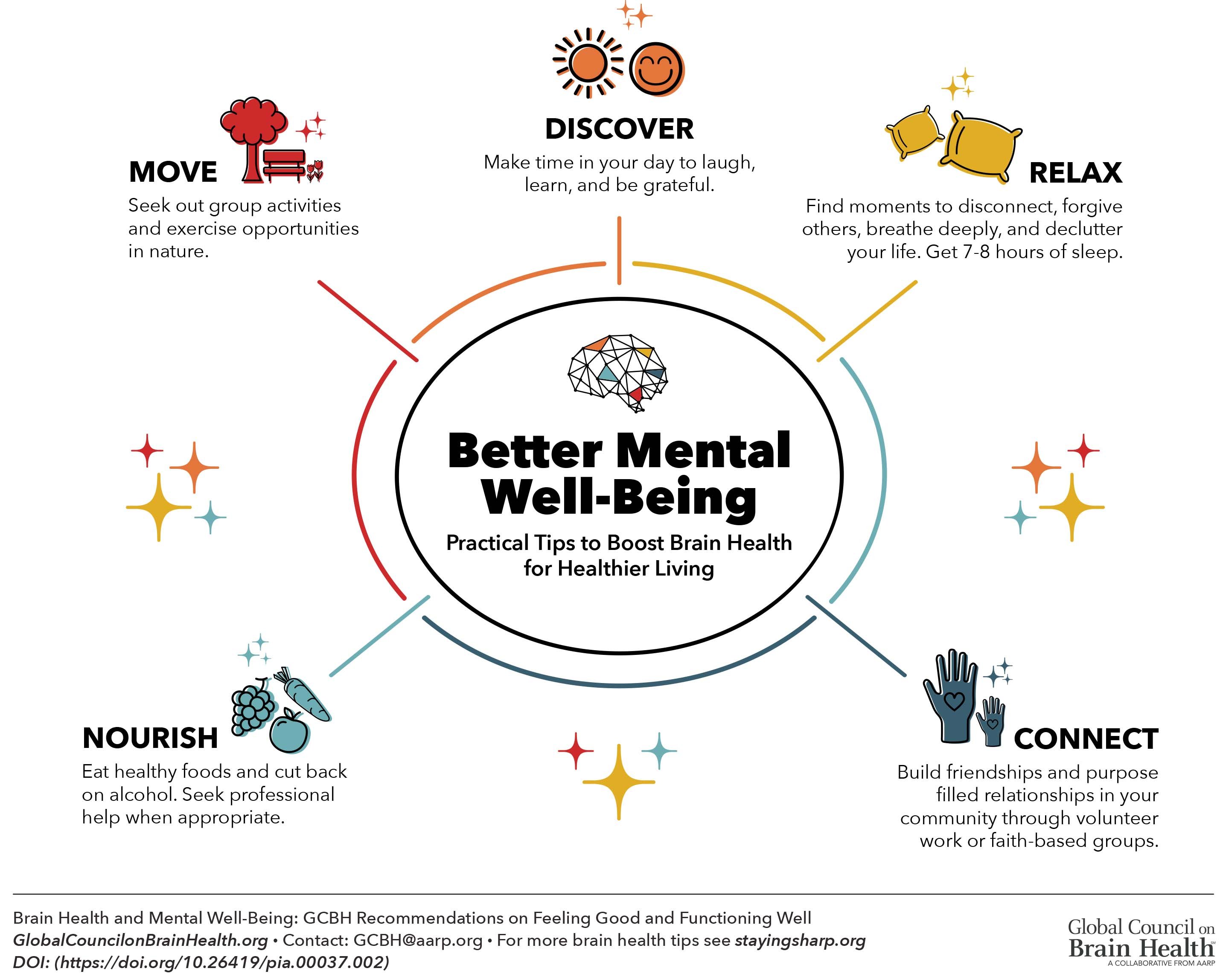Brain health and mental wellbeing
 Mental wellbeing – feeling good, functioning well and coping adequately with life circumstances and challenges – is related to our brain health as we age. The Global Council on Brain Health (GCBH) explores the evidence, as part of our Staying Sharp series.
Mental wellbeing – feeling good, functioning well and coping adequately with life circumstances and challenges – is related to our brain health as we age. The Global Council on Brain Health (GCBH) explores the evidence, as part of our Staying Sharp series.
Our advice
- Move. Seek out activities and exercise opportunities in nature.
- Discover. Make time in your day to laugh, learn, and be grateful.
- Relax. Find moments to disconnect, breathe deeply, and declutter your life. Get 7-8 hours of sleep.
- Nourish. Eat healthy foods and cut back on alcohol.
- Connect. Take the time to develop and strengthen relationships with family and friends. Reinforce your feelings of purpose in life by volunteering.
- Are mental wellbeing and brain health linked?
- Look for activities you enjoy
- Seek out meaningful connections with others in your community
- Aim to get enough high-quality sleep
- Eat healthy foods
- Find opportunities to exercise, particularly outdoors
- Become a regular volunteer in the community
- Learn something new
- Understanding the connection between brain health and mental wellbeing
Are mental wellbeing and brain health linked?
The science behind how mental well-being is connected with brain health is not well-developed. However, a number of studies of older people have linked greater mental well-being to better cognitive health, and even reduced risks of dementia later in life. On the other hand, poor mental well-being - including pessimism and not feeling useful - may interfere with people's abilities to think and reason, as well as how they interact with others and how they manage their emotions. Here are some practical things you can do to support your mental wellbeing.
Look for activities you enjoy
Regularly doing something that makes you feel good, like hobbies or exercise, is important for your mental wellbeing. It's important to find activities that appeal to you.
Seek out meaningful connections with others in your community
Joining in community activities or volunteering can boost feelings of having a purpose in life. A 2018 survey in the USA found that the more often adults age 50 and over socialised, the higher their mental well-being scores. We also know from research in UK that good social connections are good for your thinking skills.
Learn more about how social connections could help your thinking skills
Aim to get enough high-quality sleep
Get seven to eight hours sleep a night. Going to bed and getting up around the same time every day helps you to have a better night's sleep. Stay away from all digital screens before bedtime and avoid watching TV in bed. Studies have found that the LED light emitted by digital screens may prevent the brain from releasing the sleep hormone melatonin.
Eat healthy foods
Experiment with different fruits, vegetables, and eat a healthy diet. The 2018 USA survey found that men and women age 50 and over who reported eating more nutritious and well-balanced meals also had higher mental well-being scores than those who said they rarely ate nutritious meals. We also know that a healthy diet can help your overall brain health and thinking skills in later life.
More about how eating healthily can help protect your thinking skills
Find opportunities to exercise, particularly outdoors
Explore green spaces in your neighbourhood and community, including local and national parks. Many local Age UKs arrange or know of local walking groups for people of different abilities. Also, try gardening. Digging in the dirt can be a great way to relieve stress, get exercise, and promote mental well-being.
Find out how physical activity helps your brain and thinking skills.
Become a regular volunteer in the community
Those who volunteer tend to have less anxiety, depression, loneliness, and social isolation, as well as a sense of purpose in life. It’s also a good way to develop meaningful connections in your local community. The 2018 USA survey found that adults age 50 or older who volunteer at least once a year have higher mental well-being scores than those who don’t.
Volunteer with Age UK
From helping in your local Age UK shop to campaigning for change, there are lots of ways to get involved with our work where you live.
Learn something new
Find an interesting topic and learn as much as you can about it at your local library. Take a class at a local centre or the University of the Third Age (U3A). Or try out one of the many free or inexpensive online courses. Rekindle hobbies that brought you joy as a youngster, or consider trying a new hobby. Your local Age UK may also run classes or activities. Get in touch with them using the search box below.
Understanding the connection between brain health and mental wellbeing
The information on this page has been adapted from the Global Council on Brain Health's report, 'Brain Health and Mental Well-Being: GCBH Recommendations on Feeling Good and Functioning Well', published in 2018. The report lists the members of the Council and the participants in the Council's expert panel that reviewed the evidence and produced this report.
It's important to note that the science behind how mental well-being is connected with brain health is not very well developed. However, the GCBH's recommendations for older adults to maintain and improve their mental well-being are based on the current state of the science and are consistent with what we do know may help foster better brain health.

Read the full report
Visit the GCBH website to read the full report and recommendations.
Look after your mental wellbeing
Just as you can look after your physical health to reduce your risk of becoming ill, you can take care of your mental health too.

